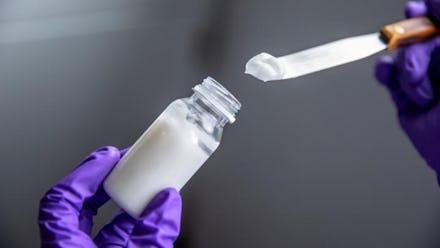Scientists created butter out of water and I don't know how to feel about it

Can't believe it's not butter? It remains to be seen whether that will be the case with the creation of a new low-calorie "butter" substitute spread that's actually mostly water. Food scientists at Cornell University have formulated what they call a healthier version of butter that has just 2.8 grams of fat and 25.2 calories in a single tablespoon. To put things in perspective, the same amount of butter has 11 grams of fat and around 100 calories.
The new spread was created after scientists figured out a way to emulsify (mixing two or more liquids that normally can't become homogeneous) water with small drops of milk fat and vegetable oil. The result is a facsimile of butter with the majority of its contents comprised of water instead of butter's 84% fat content and 16% water. With this process, the spread is able to contain about one-fourth the calories butter does without the need for artificial stabilizers.
"Imagine 80% water in 20% oil and we create something with the consistency of butter, with the mouth feel of butter and creaminess of butter," said senior author of the study and food science professor Alireza Abbaspourrad. The team uses high-internal phase emulsions (HIPE) to continue adding water to oil until a mixture of 80% water and 20% oil is achieved. The idea with this process is to help develop healthier solutions for consumers looking for better, less fattening ways to make their food taste a little better. And this new concoction can actually be adjusted based on different dietary needs and preferences. Unfortunately, it's not clear at this time when we'll be able to try it ourselves to see how it might stand to be improved a bit. There isn't a lot of information just yet on how far along scientists have come in perfecting the product.
"We can add milk protein or plant-based protein, and since the water acts like a carrier, we can adjust for nutrition and load it with vitamins or add flavors," said Abbaspourrad. "Essentially, we can create something that makes it feel like butter — and instead of seeing a lot of saturated fat, this has minute amounts. It's a completely different formulation."
But what does the formulation taste like? The composition details make sense, and we know it's definitely got to be better for you than butter. It's certainly less packed with calories and sounds a lot lighter in general. But would anyone actually want to eat it or adopt it instead of their normal spreads to kick up their mashed potatoes or corn on the cob? Does it actually taste like butter? Which one sounds better to spread on your nice, crispy toast in the morning?
Hopefully that's the end goal, anyway – the "feeling" of butter is still quite palatable after all, but it's going to need to mimic the taste of the gooey, delicious golden nectar if this new spread is going to make waves.